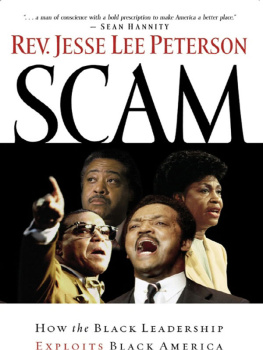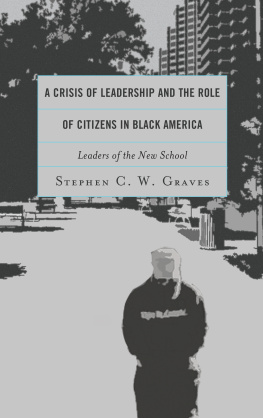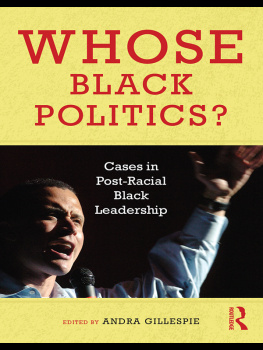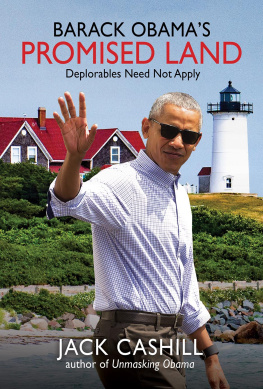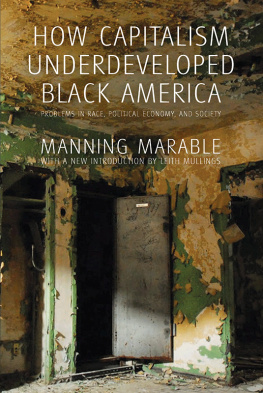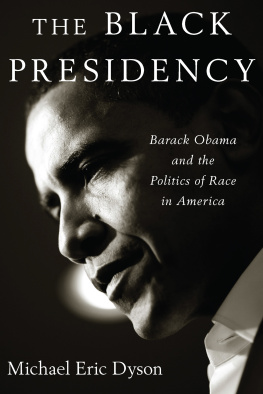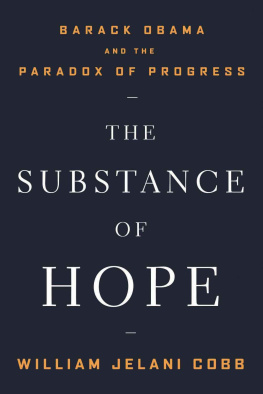Published by
STATE UNIVERSITY OF NEW YORK PRESS, ALBANY
2008 State University of New York
All rights reserved
Printed in the United States of America
No part of this book may be used or reproduced in any manner whatsoever without written permission. No part of this book may be stored in a retrieval system or transmitted in any form or by any means including electronic, electrostatic, magnetic tape, mechanical, photocopying, recording, or otherwise without the prior permission in writing of the publisher.
For information, contact State University of New York Press, Albany, NY
www.sunypress.edu
Production by Marilyn P. Semerad
Marketing by Susan M. Petrie
Library of Congress Cataloging-in-Publication Data
Jones, Ricky L.
Whats wrong with Obamamania? : Black America, Black leadership, and the death of political imagination / Ricky L. Jones.
p. cm.
Includes bibliographical references and index.
ISBN 978-0-7914-7579-9 (hardcover : alk. paper)
ISBN 978-0-7914-7580-5 (pbk. : alk. paper)
1. Obama, BarackPolitical and social views. 2. Obama, BarackPublic opinion. 3. Presidential candidatesUnited States. 4. African AmericansPolitics and government. 5. African American leadership. 6. African AmericansSocial conditions1975 7. PresidentsUnited StatesElection2008. 8. United States Race relationsPolitical aspects. 9. Political cultureUnited States. 10. Public opinionUnited States. I. Title.
E901.1.O23J66 2008
973.0496073dc22
2007049896
10 9 8 7 6 5 4 3 2 1
Once again, for Linnie Mae Jonesmy grandmother, warrior, and cancer survivor. Also, for her oncologist, Dr. Jonathan Kaufman of Emory University, who has worked diligently in helping her continue to live a bold and adventurous life. Fight on, Mama!
Also for James R. Terry, J. Blaine Hudson, Robert Douglas, and Chester Grundyoutstanding educators and men of depth and sacrifice. You are the finest examples of leadership I have known. You have all inspired me to be a better man.
Foreword
Readers attracted to catchy titles will probably be caught by this one, Whats Wrong with Obamamania? and may expect yet another version of Rush Limbaughs Barack the Magic Negro, suitable for sale at local supermarkets or Wal-Mart. Fortunately, if they read beyond the title and their own assumptions, they will be pleasantly surprised and may find that the question has no simple answer and serves only as a point of departure for a far-ranging, insightful, and illuminating analysis of black political leadership over time. In Dr. Ricky Jones extremely capable hands, this rather facetious question becomes a window into the American racial past, present, and perhaps, futurea window through which we can see much that we need, but seldom wish, to see clearly.
Asking Whats wrong with Obamamania? also poses the question, Whats wrong with Barack Obama?and for that matter, Whats right with Barack Obama? They all prompt a few other queries far more fundamental to our understanding of race in this country. For example, Why is it so unusual to consider Barack Obama a serious contender for the office of president of the United States rather than another African American making a largely symbolic run for the White House? Clearly, as the only sitting black United States senator, he is an intelligent, articulate, and capable politician. As a man of African ancestry, he is exotic but not ethnic in a pejorative sense. He neither rejects nor expresses ambivalence about his blackness as, for example, Michael Jackson and Tiger Woods have done. However, while he conforms neither to the popular stereotype of black males of the hip-hop generation nor to the older image of the black civil rights leader, he does conform to another stereotype embedded as deeply in American culture. In other words, if the image of the black male of gangsta rap is the modern incarnation of the black buck or the coon, Barack Obama, in the minds of many Americans, is the
Of course, there is a deep and fatal flaw in both the new and old versions of this stereotype. The faithful black servant is not and never can be his own master or her own mistress. White Americans have never been so trusting or so foolish as to give such servants the kind of real power and autonomy that would equip them to pursue a truly independent agenda, particularly as relates to race. However, as the past few generations have shown, white America has been willing to allow a few such useful black individuals to rise to unprecedented heightsas long as they were content to serve or preserve the interests of privileged white Americans. The list of examples is long indeedstretching from Jackie Robinson and Ralph Bunche two generations ago to Condoleezza Rice and Clarence Thomas today, and including a host of highly paid athletes, business executives, educational administrators, public intellectuals, and entrepreneurs who prosper in a political economy over which they have no real control but in which they all, whether they or others always know it or not, fill roles that make them valuable to privileged white Americansand conversely, disposable when they are no longer valuable.
This is not an impossible dilemma, but it is, I believe, a difficult one that bears directly on where Barack Obama fits in contemporary America. The postcivil rights era ended with the disputed election of President George W. Bush in 2000 and the tragedy of September 11, 2001. Although this new era has not yet been named, it dawned with the fateful intersection of a reactionary presidential administration and a national tragedy that allowed that conservative faction to seize unprecedented power and then to act nationally and globally to advance its ideological and economic interests under the guise of preserving American security. While we can only speculate about the long-term consequences of offensive wars in Afghanistan and Iraq, and U.S. global policies in general, the immediate consequences for black America and for persons of color throughout the world are becoming increasingly clear.
In this country, for example, between 2000 and 2004, the average American family lost 3.6 percent of its median income, with white Americans losing 2.1 percent, Asian and Hispanic Americans losing roughly 6.0 percent and African Americans losing 7.4 percent.losses of the Reagan and Bush (I) eras) were wiped out, literally, over night. Put in perspective, even before the disastrous slippage of the past few years, African American family income was barely 60 percent of white American family income, and, thus, the glacial process of reducing structural inequality by race was halted and reversed again, as it was a generation ago after the election of Ronald Reagan.
These gross national trends mask an even more insidious and ominous shiftthe growing distance between the haves and have-nots, that is, the hollowing-out of societies around the world as the middle-class shrinks, the haves become have-mores, and the have-nots grow more numerous and more marginal. For example, the Gini index (developed by Italian statistician Corrado Gini in 1912), which measures income inequality by comparing the total income of the poorest 20 percent of a nations population with the total income of the richest 20 percent (on a scale of 0 to 100, with 100 representing perfect inequality) is growing in most nations. At one extreme, poor nations with small groups of wealthy people have always produced high Gini coefficients. For example, Sierra Leone has a Gini coefficient of 62.9. Wealthier nations with large poor (often distinguishable by racial and color differences) populations also have high coefficients. For example, Brazil has a Gini coefficient of 60.7, South Africa 59.3. At the other extreme, nations with large middle-class populations report much lower coefficients, such as Hungary at 24.4, Japan at 24.9. Since September 11, the United States has slipped quietly from the 30s into the 40s on the Gini index. And, if the middle class is shrinking generally, the black middle classalready smaller numerically and proportionally, and already weaker in terms of actual wealth compared to the white middle classis eroding even more rapidly despite the spectacular achievements of a few moguls, athletes, entertainers, and entrepreneurs.



